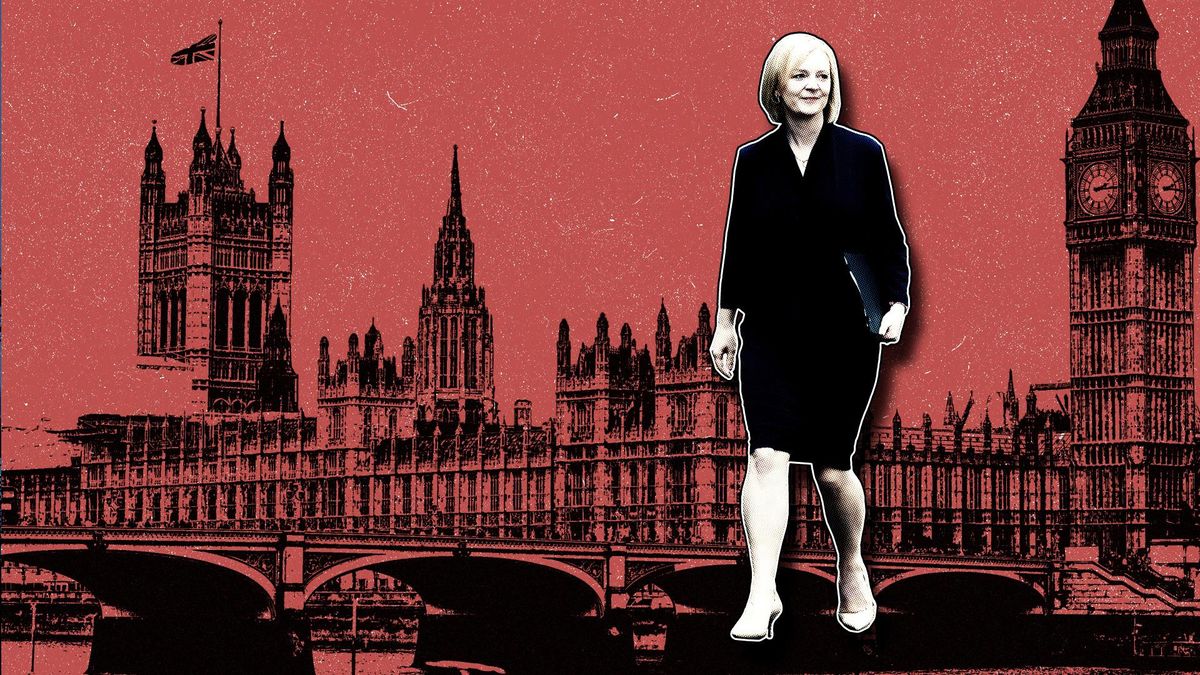British Prime Minister Liz Truss’ first few weeks in office have been a hot mess.
Markets are in a tizzy, the pound tumbled to a record low against the US dollar, and interest rates have surged. Unsurprisingly, Brits are increasingly disillusioned with their new government and Truss’ Conservative Party.
Truss’ month-long premiership has been dubbed the worst start to a new government in British history. How did she get here and what does this mean for her party — and British politics — going forward?
Growing pains. Much of the recent turmoil is linked to Truss’ contentious “high growth” economic vision, whereby she’s championed a slate of major tax cuts despite Britain’s inflationary woes.
Truss and Chancellor of the Exchequer Kwasi Kwarteng maintain that slashing taxes and deregulation will bring Britain's sluggish economy back from the dead. But they’ve failed to convince barely anyone that this is a hot idea amid a cost-of-living crisis.
As a result, Kwarteng announced at the Conservative Party conference this week that the government would ax a proposal to scrap the UK’s 45% tax rate for high-income earners. That sparked a massive backlash from … the PM’s own party.
But walking it back hasn’t been enough to calm the markets, says Mujtaba Rahman, Eurasia Group’s managing director for Europe. “The markets will not be calmed until Truss and Kwarteng put more flesh on the bones of their vague promises of supply-side reforms, including immigration, housing, childcare, financial services, agriculture, broadband, and diluting workers’ rights."
Internal Tory criticism has been varied. Some establishment Tory MPs say that Downing Street’s approach is out of touch because it requires the poor to pay for tax cuts for the rich. The party’s debt hawks, meanwhile, say Truss can’t cover the massive borrowing needed to fund the remainder of the tax cuts proposed in the recent “mini” budget.
Indeed, selling tax cuts to a party that is, well, very pro-tax cuts was supposed to be the easy part for Truss, who’s also proposed supply-side reforms – including slashing red tape and ditching a planned corporate tax hike – that could prove even more divisive. For now, at least, Truss says she isn’t backing down on the rest of her proposed agenda.
What Brits want. Truss and Kwarteng claim that they reversed course on the 45% tax rate after “listening” to the British people. But perhaps they need to come in a little closer to hear what British people really think about economic growth. In short: they couldn’t care less.
Around 38% of Brits (compared to 28%) think that “politicians focus too much on economic growth at the expense of other issues,” according to a poll by the Economist. What’s more, by a large margin — 53% to 16% – voters polled agree that “the government should spend more on health care and pensions, even if that means spending less on infrastructure and science.”
Credibility: Easy to lose, hard to get back. Truss’ credibility has taken a beating in recent days, both among the electorate and within her own party, only a third of which backed her bid in the final round of voting to replace former PM Boris Johnson.
Part of the reason for Truss’ diminishing status is the ill-conceived timing of her “go big or go home” pitch. As the war in Ukraine continues to disrupt global energy supplies, sending energy prices through the roof, more than 7 million British households are headed towards fuel poverty this winter, meaning they’ll spend at least 10% of their incomes on energy.
Unveiling an economic package that slashes taxes for those at the top makes for bad optics and even worse politics.
Truss tried to win over hearts and minds during her keynote address Wednesday at the Tory conference — where her options were not great. She didn't backtrack on additional parts of her economic agenda, which could be viewed as an admission of ineptitude. But standing firm on “growth, growth, and growth” might boost the chances of a parliamentary rebellion, with reports that some Tory MPs are already plotting with the Labour Party on how to block parts of the PM’s agenda.
“The chaos makes Truss’ speech [...] even more critical,” says Rahman. “MPs have been so furious at the way the government has gone about its early days that some have talked of Truss being gone by Christmas.”
For now, at least, the chaos continues.


















